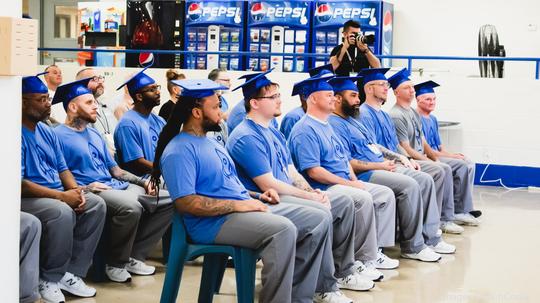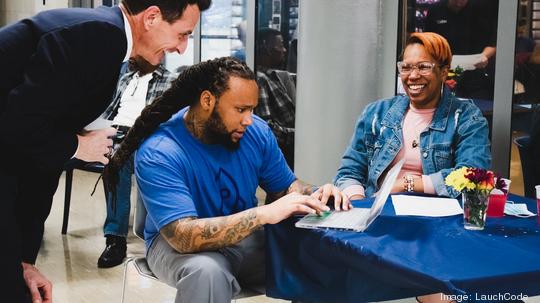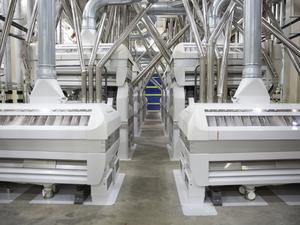
Since its founding in 2013, St. Louis nonprofit LaunchCode has focused on helping those with non-traditional backgrounds establish technology careers. It’s recently taken its programming to a new place where it says there’s an “untapped talent source” for the region: Missouri’s prisons.
In March, LaunchCode held a graduation ceremony for the first cohort of its JusTech program, which included 17 inmates at Missouri Eastern Correctional Center (MECC) in Pacific completing its training course. LaunchCode has begun a second cohort at MECC and is expanding its JusTech program to Algoa Correctional Center in Jefferson City, Missouri. LaunchCode says it plans to work with JusTech graduates following their completion of the program and their release from prison by helping them pursue continuing education and career opportunities. JusTech graduates released from prison will be eligible for its apprenticeship program.
LaunchCode is the latest St. Louis-area nonprofit to offer re-entry opportunities for former inmates. Concordance, led by former Wells Fargo Advisors CEO Danny Ludeman, works with inmates with programs that help them to return to the community.
But LaunchCode Executive Jeff Mazur says programs like JusTech — which, so far, has just over a dozen graduates from its first cohort — won’t solve the region’s workforce needs alone. The initiative, he said, highlights the need for training programs and employers to go to unexpected places to source workers.
“From our perspective, we build initiatives at LaunchCode like the JusTech initiative that are geared toward finding a universe of people who otherwise are not going to have that opportunity and giving them that opportunity,” he said.
The Business Journal caught up with Mazur to chat about its new JusTech program and workforce trends. The conversation has been edited for length and clarity.
You said 17 of the 22 inmates who enrolled in the first JustTech cohort graduated. That seems to indicate an interest from the inmates in being trained. What does that graduation rate say about the need for workforce programs that focus on untapped talent sources? The overarching principle that is behind everything we do at LaunchCode is the idea there are people in every circumstance who really can and should be doing that. The barrier for those people is not that they can’t do it, but that the pathway by which they can do it is not articulated or made available to them — whether it’s someone has been locked up for the last 18 years in Pacific, Missouri, or because they are working 24 hours a week as retail clerk in St. Louis County and just don’t understand this program exists or it can be a pathway for them. That’s fundamentally the same problem. What you really need to do is create a mechanism by which you can find as many as people out there, help them understand what the opportunity is, make the opportunity very low-risk and at no cost to them, and show them there’s a pathway to do it. I don’t think that fundamentally the reason why it’s important to do it for justice-involved individuals is any different than the reason we should do it for everyone who’s out on the street today who has a career that’s unsatisfactory to them.

Some employers may be hesitant to hire employees from non-traditional backgrounds without a four-year degree in their field. What would you say to employers who feel that way? Our perspective is that, particularly in this technology space, that the toughest and most resilient software developer or technologist. That’s really what you want on your team, the people who have had to overcome the most in order to gain those skills and get to where they are. It’s those people that think through difficult problems, who persist when things get difficult. We should urge people to remember that. Perhaps it’s someone who has been through the challenges of incarceration or it’s someone who has been through the difficulty of caring for their family after having been in industry that got shut down by the pandemic. Those things ought not to raise concerns about an employer about a person's ability to do the work, but quite the contrary. Those things are the very markers of the people who are going to be really tough in the workplace environment, persist through difficulty and stick with it to solve problems you need solved.
Do you think employers have become more receptive as a whole to hiring people from non-traditional backgrounds? Yes, absolutely. When I started working with LaunchCode in 2015, we viewed one of the organization’s fundamental challenges and purposes as really trying to focus on that piece of changing minds. There’s still an element of that that happens, but I think there’s no better driver of change than circumstances that require you to change and evolve. What we’ve seen, particularly today, but even over the course of the last seven years is recognition on the part of employers that simply doing it the way they’ve always done it was a recipe for utter disaster. Entirely apart from anything LaunchCode has done or any advocacy that we’ve done with employers, I think there is naturally an impulse on the part of employers to say “you know what, we have in the past been far too restrictive in the ways we thought we can do this work and that is no longer is going to be a successful strategy for us.” I think the world is much more open in that regard today.
There’s been a lot of talk during the pandemic about employees in industries like food service changing careers. Have you seen that at LaunchCode? Particularly in the first six months of the pandemic, we saw the exodus from very obvious industries, like food and beverage, restaurants and hospitality. People needed to do something else and there are a lot of great individual stories about people who had fulfilling careers that they liked in the restaurant industry that didn’t have that as an option any longer when the pandemic started and they were forced down this road. It wound up being a good thing they did, from their perspective. We saw a lot of this. One of things we’re seeing now because of things that are related to pandemic and other factors is a non-trivial moment from people who work in the education space who are educators themselves and who have dealt with some very difficult circumstances over the last two years who are saying “I want to do something else. I need to do something else. I can’t do this any longer” and are identifying technology careers as something that meets their needs, that seems fulfilling to them, and that is a good fit for their aptitude and skill sets. We see lots of educators, whether while they continue to teach or after having left the field, come to LaunchCode and our programs and move to technology careers.











